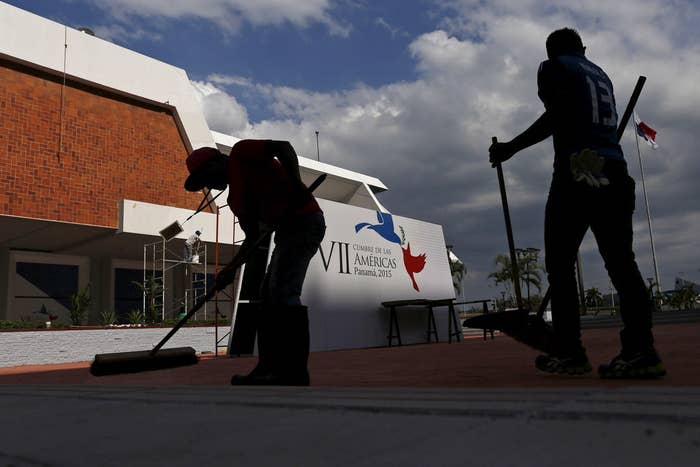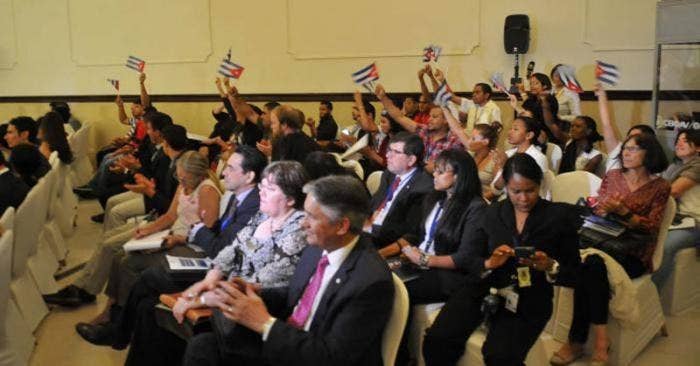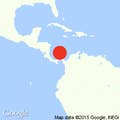
PANAMA CITY, Panama — All eyes are on Cuban government officials, leaders of the Cuban opposition and emerging businessmen and artists from the island as the Seventh Summit of the Americas, a gathering of nearly all Western Hemisphere heads of state, hosts the Communist-governed country for the first time in its 21-year history.
A potential meeting between Cuban leader Raúl Castro and U.S. President Barack Obama — the first since the leaders announced they would re-establish diplomatic relations after more than 50 years of enmity between Cuba and the U.S. — is one of the most highly anticipated moments of the gathering, though non-political Cuban actors are generating nearly as much excitement in the events leading up the Summit.
The diverse composition of the Cuban contingent — official and otherwise, including more than 100 non-government representatives — is a reflection of the changing economy and culture on the island. Juan Bautista Gónzalez Escalona, president of Cuba Ron Corporation which produces and sells spirits, anti-government hip-hop artist Silvio Liam Rodríguez, and the president of a taxi cab cooperative in Cuba, Martín José Betancourt, will be participating. So will farmers, teachers and painters, according to multiple reports in Cuban media.
"It's kind of a beautiful thing. You have Cubans going together and interacting," said Christopher Sabatini, adjunct professor at the School of International and Public Affairs at Columbia University. That this widely diverse Cuban contingent came together at the Summit "demonstrates for the Cuban government a real element of change. It allowed opponents to go to a summit and speak and participate as equals," added Sabatini.
The beauty Sabatini saw was dampened early on in the lead-up to the Summit, however. A group of official Cuban delegates temporarily walked out of a meeting on Wednesday, citing the presence of "mercenaries" and demanding that access be revoked for the people "who don't represent the real Cuban society and who have proven links with terrorists," according to Granma, the Communist party newspaper.
Pro government participants later scuffled with members of the opposition at a local park, according to La Prensa, a Panamanian newspaper.

In recent years, Cuba has undergone a major economic shift, unimaginable during the decades when Fidel Castro led the country. Cubans can now travel more freely off the island, own and sell homes and cars and openly expand their businesses. Internet has become more easily available and Yoani Sánchez, one of the most outspoken government critics on the island, launched an online news outlet, 14ymedio.
Problems still dog the economy. Monthly government salaries of around $20 make it impossible for many in Cuba to purchase the homes and cars that are now becoming available. Internet access, too, remains prohibitively expensive at $4.50 an hour, according to Etecsa, the government-owned telecommunications company.
The question remains, have Cubans adapted to these gradual changes?
"One can hope that there's more civil society in Cuba and it's more civil to each other. This will be the first test." said Geoff Thale, program director at the Washington Office on Latin America, adding that Cuba has gone from being a pariah state twenty years ago to a normal, full member of the community of governments of the Western hemisphere.
It is the first time Cuba is invited to participate in the Summit since its launch in 1994 in Miami, Florida. The Summit — a political meeting which this year is accompanied by parallel events for economic actors, youth and university employees — is meant to foster discussions of common challenges and the strengthening of democracy in the Americas. Cuba's exclusion had been a divisive issue at previous Summits, including the most recent one in Cartagena, Colombia, in 2012, which the presidents of Ecuador and Nicaragua stayed away from, partly because Cuba was not invited.
Official Cuban attendees participated in several debates in recent weeks, including one online on Pensando Américas, a left-leaning website about hemispheric affairs. Migration, security, energy and the environment have been some of the issues on the agenda.
For members of the opposition, the Summit also presents an opportunity to voice their demands. Rosa Maria Payá, daughter of the late dissident Oswaldo Payá, unveiled Cuba Decide, a project aiming to increase citizen participation in the country. Her participation has not been without hurdles, however, as Payá said via Twitter on Sunday that authorities had detained her at the international airport here upon arrival.
"You will be deported to Cuba if you cause any disturbance, take any banner. Go to your country to cause disturbances," tweeted Payá, quoting an unnamed airport agent. The Panamanian Foreign Ministry later apologized, calling her detention a bureaucratic error.
Still, the expectation has been building for a population that views this as the most visible international event for their country since 1962, the year the U.S. and the Soviet Union came the closest to a full-scale nuclear war.
"Panama is giving us the opportunity to close the cycle of a long transition from the uncivil language to the civil language," wrote Manuel Cuesta Morúa, spokesperson for the Arco Progresista political party, in 14ymedio. "To the Cuban government, it gives it the occasion to also begin this transition. The faster the better," he added.

